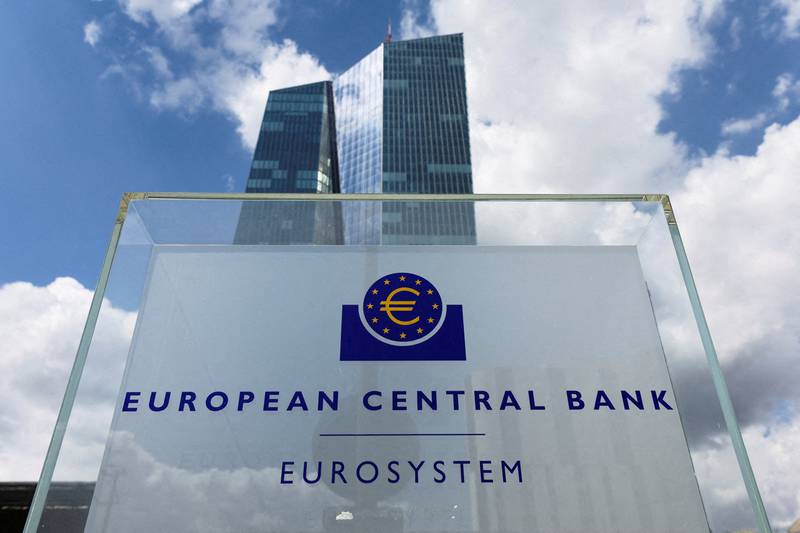ECB expected to raise interest rates to tackle inflation

The European Central Bank looks likely to raise its interest rate to the highest level in more than a decade to tackle soaring inflation.
Economists are predicting a second straight 75 basis-point increase on Thursday. Money-market investors concur, suggesting the deposit rate will double to 1.5 per cent. Inflation is almost 10 per cent, five times the ECB’s medium-term target.Read More : ECB must tighten rules to counter inflation But in a potentially more important decision, the bank is also likely to take the first steps to reduce its €8.8 trillion ($8.86tn) balance sheet, bloated by years of debt purchases and ultra cheap loans extended to banks.
"The ECB is still in catch-up mode," BNP Paribas said. "We think there is now a comfortable majority for taking rates into restrictive territory."
Wresting inflation back to an acceptable level is so far taking precedence over shielding the economy from an energy-driven downturn this winter.
After a retreat in the euro, the ECB is also under pressure to match the Federal Reserve’s aggressive increase in rates.
Hawkish members of the ECB’s governing council, such as Germany’s Joachim Nagel, insist rates must continue to rise, despite the looming recession, because inflation is alarmingly fast. "Further interest rate hikes will be needed to bring the inflation rate back to 2 per cent in the medium term — not just at the monetary policy meeting at the end of October,” Mr Nagel said in Washington recently. "The ECB governing council must not let up too soon.”
Doubling the deposit rate to 1.5 per cent would bring it much closer to a level that officials consider to have a “neutral” impact on the economy.
Some say rates may have to be pushed beyond that point, into restrictive territory, to get prices under control. Others have cautioned against going too far too quickly, for fear of having to backtrack later — recalling policy errors during the global financial crisis.
There are also signs of emerging political resistance to raising rates into a recession. Italian Prime Minister Giorgia Meloni criticised the ECB in her first speech to parliament this week, while French President Emmanuel Macron has warned against crushing demand through increases.
The pace of increases is likely to slow to 50 basis points in December, according to economists, who see two more steps of half that magnitude before the peak is reached. Indeed, the ECB’s end point is quickly becoming the focus among market watchers.
Economists are predicting a second straight 75 basis-point increase on Thursday. Money-market investors concur, suggesting the deposit rate will double to 1.5 per cent. Inflation is almost 10 per cent, five times the ECB’s medium-term target.
"The ECB is still in catch-up mode," BNP Paribas said. "We think there is now a comfortable majority for taking rates into restrictive territory."
Wresting inflation back to an acceptable level is so far taking precedence over shielding the economy from an energy-driven downturn this winter.
After a retreat in the euro, the ECB is also under pressure to match the Federal Reserve’s aggressive increase in rates.
Hawkish members of the ECB’s governing council, such as Germany’s Joachim Nagel, insist rates must continue to rise, despite the looming recession, because inflation is alarmingly fast. "Further interest rate hikes will be needed to bring the inflation rate back to 2 per cent in the medium term — not just at the monetary policy meeting at the end of October,” Mr Nagel said in Washington recently. "The ECB governing council must not let up too soon.”
Doubling the deposit rate to 1.5 per cent would bring it much closer to a level that officials consider to have a “neutral” impact on the economy.
Some say rates may have to be pushed beyond that point, into restrictive territory, to get prices under control. Others have cautioned against going too far too quickly, for fear of having to backtrack later — recalling policy errors during the global financial crisis.
There are also signs of emerging political resistance to raising rates into a recession. Italian Prime Minister Giorgia Meloni criticised the ECB in her first speech to parliament this week, while French President Emmanuel Macron has warned against crushing demand through increases.
The pace of increases is likely to slow to 50 basis points in December, according to economists, who see two more steps of half that magnitude before the peak is reached. Indeed, the ECB’s end point is quickly becoming the focus among market watchers.
Source: japantoday.com
